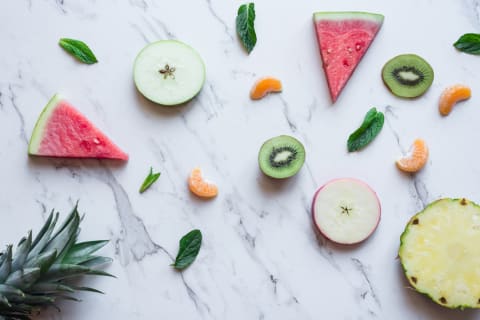Advertisement
5 New Ways To Actually Quit Sugar (Even If Everything You've Tried Has Failed)


Most of us start the new year with a resolve to change some part of our diet, whether it's for weight loss, clearer skin, a better mood, greater vitality or resolving digestive issues—all of which often come back to ditching sugar. If you've tried to take sugar out of the diet before only to find yourself sneaking in bites of the leftover office-meeting brownies a week later, it isn't that your willpower is weak or that sugar is addictive. There are invisible forces dictating your choices on a regular basis.
Why You Can't Quit Sugar
1. You're not addressing why you crave sugar.
You can crave sugar for a multitude of reasons:
- Destabilized blood sugar levels because of a junky diet, lack of sleep, or stress
- A gut microbiome imbalance such as an overgrowth of yeast, which makes you crave more sugar because that’s how the yeast survives
- You're sad, bored, and need to reward yourself with sugar
- You've created a habit, such as eating a treat after dinner every night

2. You know sugar is bad, but you give artificial sweeteners (including stevia!) a free pass.
Liquid sugar, like soda, is more damaging than sweet foods because it bypasses the satiety mechanisms. It doesn't send a message to the brain to say that you're full. As there's no corresponding reduction in calories; the soda simply leads to more weight gain. No surprise there, but did you know diet sodas aren't any better? In fact, noncaloric sweeteners such as aspartame, Splenda, and saccharin can change how glucose is regulated and the composition of the gut microflora for the worse, making it, ironically, even harder to lose weight. What about stevia? The research is new and mostly on animals but one group of researchers found1 that rats had increased weight gain when stevia was consumed. If you're drinking any form of soda or diet soda, make it your priority to drop this habit this week.
3. You believe that you're addicted to sugar.
Sugar is not addictive. The research2 showing that sugar is more addictive than cocaine was done with saccharin (a noncaloric sweetener), not sugar. If you feel addicted to sweet foods, it's likely that the sugar was combined with fat, like butter or coconut oil. The sweet/fat combination is much more addictive than sugar itself. Most people aren't eating sugar straight from the packets!
When you say that sugar is addictive, you disempower yourself.
It implies that you have no control of your intake of sugar. You do. And it's time to take your power back!
5 Steps to Quit Sugar for Good
1. Start your day with a protein-based breakfast.
Eggs, chia seed pudding, or a smoothie made with pea protein powder helps to stabilize your blood sugar levels, so you can avoid the glucose drop that causes intense hunger and sugar cravings. Pea protein has been shown to decrease the appetite more than whey protein, the traditional dairy base for smoothies, and it improves the gut microflora.
2. Don't skip fruit.
Fruit is not a string of sugar molecules that needs to be avoided.
It's rich in phytonutrients, vitamins, minerals, and fiber that helps rebalance your biochemistry. The trick is not to sit down and eat an entire fruit platter, as that is too much sugar. Instead, allow yourself to have two pieces of fruit per day: one in your morning smoothie and one as an afternoon or evening snack when your sugar craving kicks in. Fruit will squash a physical craving for sugar. If it doesn't, the craving is coming from your mind—i.e., it's being driven by a habit or an emotional response.

3. Get at least 7.5 hours of sleep.
Yes, sleep helps decrease sweet food cravings! When researchers asked women to reduce their sleep from their regular 7.5 hours to 4.5 hours for four consecutive nights, they craved sweet foods and ate more than 400 extra calories a day! Don't skimp on sleep. It goes against all of your wellness goals. If you can't sleep, take 300 mg of magnesium to help induce a deeper level of sleep, or check out mbg's insomnia class.
4. Ask yourself why.
Before you put those M&M's into your mouth, ask yourself why. Are you bored? Sad? Simply eating mindlessly? What's really going on? It can be helpful to keep a diary of how you feel when you reach for a sugary snack and then address the recurring underlying issue, either by stopping the things that are making you bored (do you really need that sixth Netflix episode?), meditating, or working on underlying mood issues with a professional.
5. Make peace with sugar.
Complete abstinence from sugar isn't necessary, leads to beating yourself unnecessarily if you have one tiny slip up. Instead, allow yourself to have a treat once a week, whether it's dark chocolate, coconut macaroon, or birthday cake. Make this a conscious choice and enjoy every morsel. Make it special and serve it on a plate so that the mind recognizes that you're eating it. Enjoy it with relish, then get back on track the next day. Sugar doesn't need to be avoided, just eaten wisely.
Breaking sugar cravings is complex, but I hope these tips get you started and help you trust yourself around sugary food. If you want a more complete solution, please check out my mbg class, which helps with sugar and any other food cravings you might have.